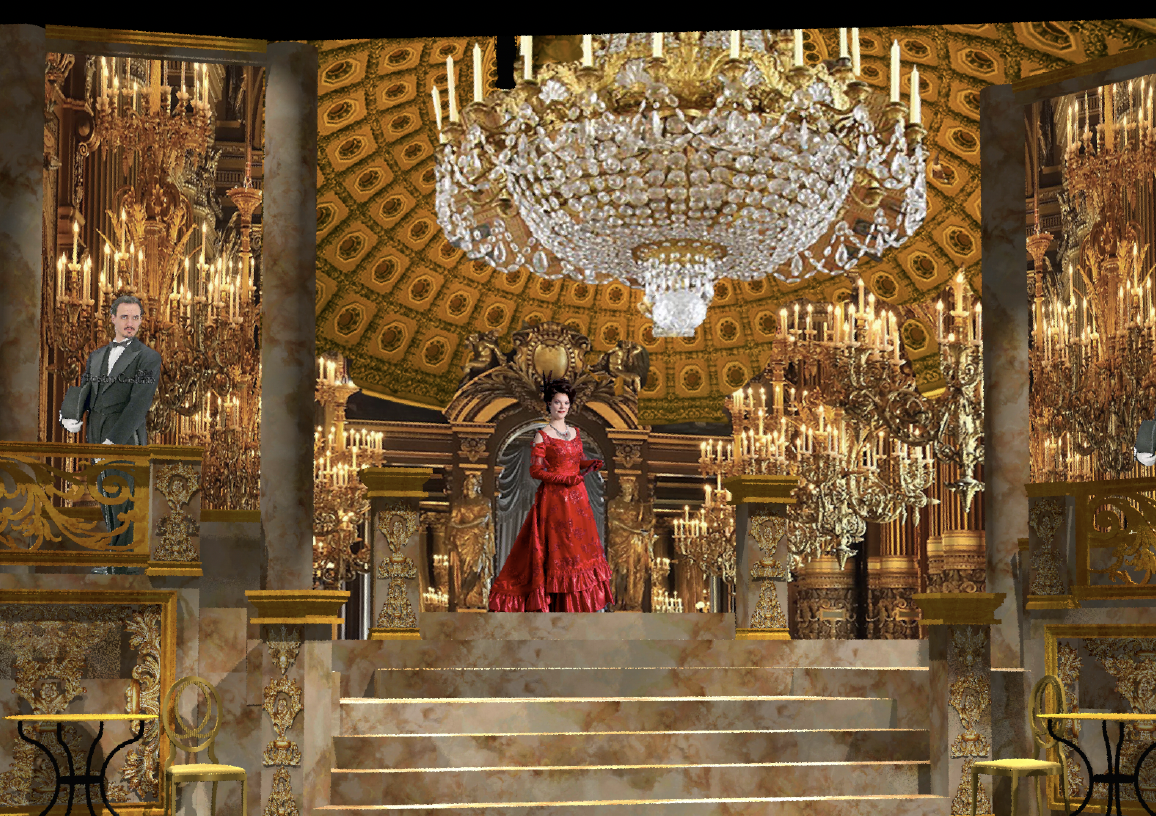After two years of pandemic-forced closures, West Bay Opera has returned to Palo Alto’s Lucie Stern Theatre, where conductor and general manager José Luis Moscovich opened their 67th season with a glowing production of La Traviata.

Verdi’s opera on the love, sacrifices and untimely death of a prostitute met with a hue and cry from the critics of 1853, but was an early hit with the public, particularly among women. The sensitivity of his music humanized a figure that is often scorned.
La Traviata, or “The Fallen Woman,” opened with a searching piquancy, high violins teasing out a theme. José Luis Moscovich guided the excellent pit orchestra from that sweet painful texture to a slow intimate waltz. Verdi drifted his hook, enchanting us into this tale of love and death. And then in a quick-change of the music to light-hearted laughter and skirling flutes, Verdi jerked the line and began to reel us in. The curtains rose on a gilded brothel.
The well-known drinking song, “Brindisi,” followed, introducing us to the two protagonists and to the two sides of their argument. As love-struck Alfredo, tenor Alonso Sicarios Léon raised his glass to “love’s sweet tremors,” and “eyes that pierce the heart.” His voice had a purity that is striking, an effortlessly liquid sound of a tenor in his prime.
Shaina Martinez starred as the courtesan, Violetta, with a rich lower soprano register and highs that had enough edge to cut through the orchestra, all propelled by an open-throated warmth. She took the next verse, replying that life is just pleasure.
And in the following duet, “In de Felici,” he fully bares his heart to her. “Love is the pulse of the whole world,” sang Léon.
“Forget about me!” Martinez replied. “I cannot deal with such a love … I must always be free, rushing from pleasure to pleasure.”
And although they seem at odds, their music ends in a slow-dance of harmonies, two sides of the same coin yearning towards each other. In this, Léon and Martinez were well-matched, his tones of liquid gold and hers of richest velvet. Gorgeous!
The third pole of the dramatic tension is Alfredo’s father, Giorgio Germont, sung by baritone Jason Duika. His voice was as wide and graveled as river shallows. As he cruelly beseeched Violetta to break off relations with his son, “For God” and “for family honor,” his instrument gave authority to the sanctimonious stance of his ask.
In the intimate acoustics of the Lucie Stern Theatre, this production was all one could ask for, with a great supporting cast and enthusiastic chorus. And the sets by Peter Crompton instantly drew us into the action. However did they shift from the marble colonnades of a brothel to simple country estate and then to chaste bedroom with just a few drapes and art frames?
And that chaste bedroom! After a return of those high haunting violin passages, the long third act is where they all came together to witness her sacrifice of love and a life cut short. Martinez’ “Addio” was a soft and powerful prayer, and her duet with Léon was heart-wrenching. In fact, I’m not sure there were any dry eyes in the house.
Giuseppe Verdi was furious when the Italian opera censors insisted that his new opera be performed with costumes and sets from 100 years earlier. This was presumably to dull the point that Verdi was trying to make with his sensitive portrayal of a courtesan, directly offending the conservative mores of his times. But have times changed that much? I find it curious that each of the three productions I have seen of this opera uses antique dress, the florid costuming of a pre-Verdi era, each again diverting us from understanding our own enablement and sexism. As we grapple with Roe v. Wade, are we once again punishing women for “falling”?
West Bay Opera continues their first full season post-pandemic with Mozart’s Don Giovanni for four performances in February. Mozart in this perfect space with this level of artistry? It doesn’t get better than that! See details at www.wbopera.org.
—Adam Broner
